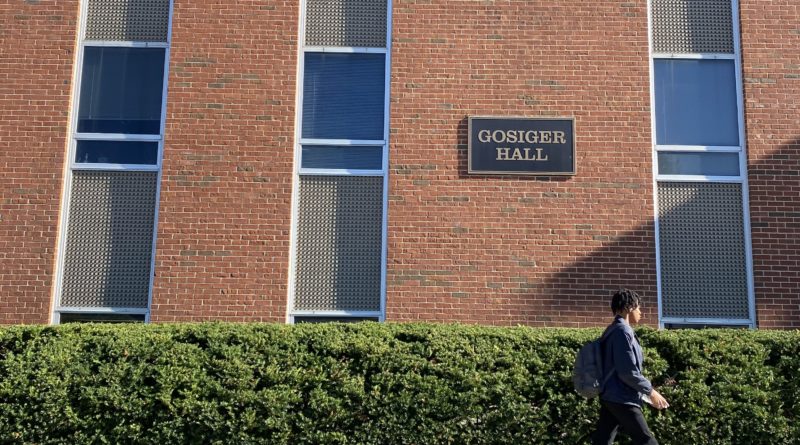COVID’s continued impact on students’ mental health
COVID-19 has had a continued toll on student’s mental health, yet there are many UD services and strategies designed to help with their struggle. Photo of Gosiger Hall, home of UD’s Counseling Center, courtesy of Maddy Bartsche.
Tori Miller | Staff Writer
Since the COVID-19 pandemic reared its head in the early months of 2020, numerous health professionals have reported long-term implications on the mental health of people. With the pandemic taking form as a persistent and chronic stressor, rates of depression and anxiety — particularly in college students — has been on the rise. Due to the pervasive nature of the virus, things such as positive thinking, effective coping strategies and remaining hopeful have become more challenging for college students.
“What is clear, though, is that the pandemic’s far-reaching devastation could raise the risk of mental health issues for a number of groups, from health workers and those grappling with ongoing COVID-19 symptoms to caregivers and kids kept out of school for more than a year,” says Andrew Joseph, a general assignment reporter at STAT News.
Erin Shiner, clinical psychologist and associate director at University of Dayton Counseling Center, claims that “anxiety, in particular, has been rising significantly in the past ten years, although there has been an increase in depressive symptoms as well.”
Back in 2019, UD conducted a Healthy Minds survey in the spring prior to COVID to gauge the overall mental health status of students on campus. At that point in time, nearly 77% of students reported that their academic performance over the past four weeks was impaired by emotional or mental difficulties. In addition, 54% of students reported that the level of stress they experienced in the last 12 months was “more than average” to “tremendous.”
Through conversations with various UD students, it was universally agreed that the top three primary concerns of COVID-19 related issues were (1) the fear of loved ones suffering from COVID-19’s health risks (2) facing isolation from family members and friends and (3) the uncertainty of the virus’ next move and how the world will be impacted.
While many students share these same primary concerns, according to Shiner, it has been “difficult for students to believe they can learn to cope effectively with their mental health struggles.”
While students may have a troubling time with learning to cope, Shiner is confident that this generation of students are much more cognizant of how pervasive mental health concerns are and are more willinging to seek necessary help for themselves and recommend help to friends and peers.
Lindsey Young, interim mental health education coordinator and graduate assistant at the Brook Center for Empowerment and Wellbeing added that “more students are self-disclosing mental health concerns and/or diagnoses both because the time in isolation brought to light existing concerns or new concerns have developed.”
UD’s Counseling Center has developed a three session “Anxiety & Depression Toolbox Seminar” and “Let’s Talk” meetings as a way for students to gain more information and discuss specific areas of concern. Both of these workshops are targeted towards teaching students positive coping strategies and to find one’s best path to feeling symptom relief.
To join the Anxiety & Depression Toolbox Seminar, participants should call 937-229-3141 to set up an Initial Consultation. To have a Let’s Talk meeting, students can sign up on the Counseling Center website.
The Brook Center suggests two positive and relaxation-based coping strategies: (1) mindfulness and engaging with the five senses and (2) grounding, which focuses on the utilization of sensory systems: sight, touch, sound, taste and smell.
Associate Director of Residence Life Ministry for Neighborhood Ministry, Colleen Brown, actively encourages students to practice appropriate self-care given the stress that accompanies the times that we are living in. She reminds students that it’s a good thing to learn how to say “no” to some things in order to remain physically, mentally and spiritually healthy.
For more information on coping strategies, ways to relieve mental health-related stress, and education on warning signs that a friend or classmates may be struggling with their mental health, visit here.
With all of the uncertainties that have come to light from COVID-19, Brown remains hopeful for the future of UD’s students navigating issues of mental health.
“There seems to be a palpable eagerness to re-establish a sense of belonging as we continue to live through the pandemic,” Brown said. “Hope imagines new possibilities beyond the present moment.”
Young best summarizes the goal of care providers, resources and commitment to community through a powerful statement: “It is our priority that all members of our institution understand that no matter where life turns, there will always be the Flyer Community ready to stand behind them and provide support and encouragement.”
While mental health complications have been a divisive factor since 2020, and before then as well, these challenges will not (and should not) be conquered alone, especially not at the University of Dayton. Each and every student has dealt with some form of distress due to the COVID-19 pandemic. Instead of blaming the world or each other for the unsettling nature of our current situation, try to foster understanding and strengthen the UD community that we’ve all come to love.
For more campus news, like Flyer News on Facebook and follow us on Twitter (@FlyerNews) and Instagram (@flyernews).

